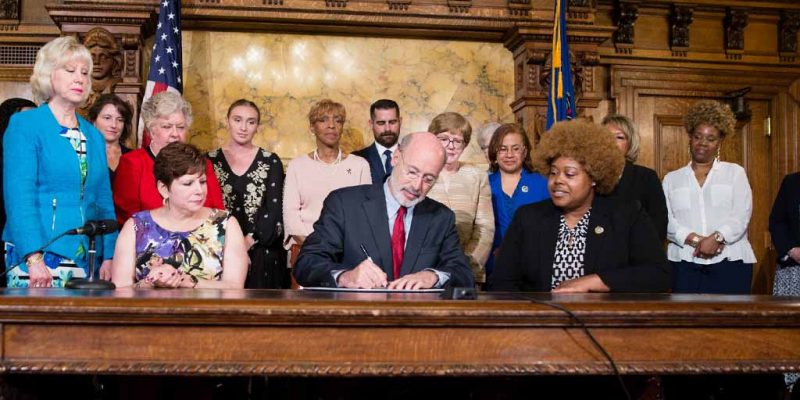HARRISBURG – With Pennsylvania women still paid significantly less than men for the same work, Gov. Tom Wolf took action to address the gender pay gap that hurts women, families and businesses.
Joined by First Lady Frances Wolf, Sens. Christine Tartaglione and Judy Schwank, Reps. Maria Donatucci and Brian Sims, as well as the Pennsylvania Commission for Women and other advocates, Wolf signed an executive order ending the practice of state agencies requiring a job applicant to provide their salary history during the hiring process and called on the General Assembly to pass similar protections for all working women in Pennsylvania.
“The gender wage gap is wrong,” said Wolf. “It’s wrong for women, wrong for families, wrong for business and wrong for the economy of Pennsylvania.
“This executive order begins to end this discriminatory practice, so that women hired by the commonwealth are paid what they deserve, and the wage gap does not follow them to a state job.
“All women deserve this same protection, but with federal inaction, the state must take steps to close the gap. Working together, we can ensure that equal pay for equal work is a reality in Pennsylvania.”
Executive Order 2018-18-03, Equal Pay for Employees of the Commonwealth, directs state agencies under the governor’s jurisdiction to:
- No longer ask job applicants their salary history during the hiring process;
- Base salaries on job responsibilities, position pay range and the applicant’s job knowledge and skills;
- Clearly explain the pay range on job postings.
The Executive Order, which applies to management-level positions, takes effect in 90 days.
The governor was joined by several legislators who are sponsoring legislation to strengthen Pennsylvania’s equal pay law protections to prevent private sector employers from requiring job candidates to provide their salary history or paying less based on gender, which perpetuates the wage gap.
“In 1959, the Pennsylvania legislature passed a law to correct the gender pay gap, yet here we are, almost 60 years later, and women are still getting short-changed,” said Tartaglione.
“Women with the same education, training, skills and job responsibilities as their male counterparts should be paid the same. But that’s still not happening.”
“We must support efforts to recognize the equal value of work without regard to the worker’s gender and especially to uplift the many families, and many female-headed households, whose livelihoods and welfare depend on the pay earned by women,” said Schwank.
Women working full-time, year-round in Pennsylvania are paid just 79 cents on the dollars of what men are paid, a gap of 21 percent, worse than the U.S. wage gap of 20 percent.
Pennsylvania ranks 29th out of the 50 states for pay disparity, and fifth among its seven surrounding states. That means Pennsylvania women need to work nearly 15 months for the same paycheck a male worker earns in just a year.
“We must ensure that Pennsylvania women receive equal pay for equal work,” said Sims.
“I have introduced legislation year after year to combat pay inequity in Pennsylvania, and year after year Republican leadership prohibits its consideration.
“Fortunately, Governor Wolf recognizes the impact pay inequity has on women and families across the commonwealth and through this executive order Pennsylvania takes a needed step towards rectifying this longstanding problem.”
“Today is a momentous day in Pennsylvania and I commend Governor Wolf for today’s announcement as we work to assure equal pay for equal work,” said Donatucci.
“Pennsylvania’s Equal Pay Law was enacted in 1959 and has not been updated in over 50 years. More important than words are action, and I am confident that together we can make the changes we need to assure that all employers in the Commonwealth pay people what they are worth.”
Wage discrimination has real consequences for women and their families. The financial hit costs women thousands of dollars a year, and over a career, women earn $1 million less than men, according to the American Association of University Women.
“This is a vital step in leveling the playing field and attracting more women to serve in state government,” said Randi Teplitz, chair of the Pennsylvania Commission for Women.
“We thank Governor Wolf for his continued dedication to closing the gender pay gap in Pennsylvania, and our hope is that this measure inspires the General Assembly to take action on equal pay.”
The pay gap makes it harder for women to buy homes, pay for college and care for their families. Today, 42 percent of mothers are the primary breadwinners of their families.
The wage gap starts when women begin their careers. One year after college, women earn 7 percent less than men with similar jobs, education and hours worked.
